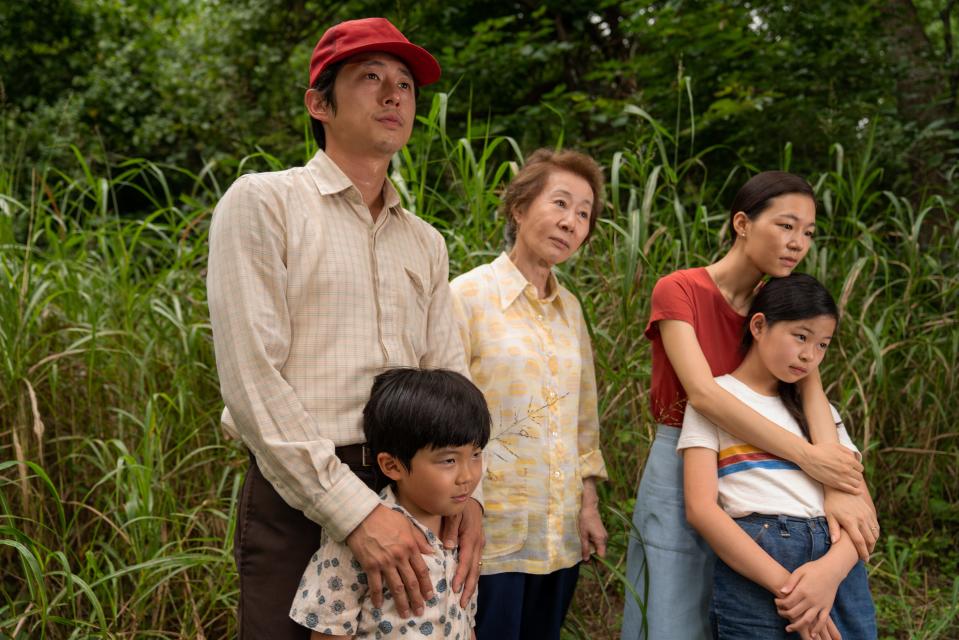Here's why 'Minari' is truly an American story, even if the Golden Globes disagree
- Oops!Something went wrong.Please try again later.
- Oops!Something went wrong.Please try again later.
Shot in America, about America, by an American filmmaker, "Minari" is an authentically American story – even if the Golden Globes disagree.
"Minari" (in theaters, available Feb. 26 via video on demand) tells the story of a Korean American family relocating to rural Arkansas in pursuit of patriarch Jacob's (Steven Yeun) ambitious American Dream: growing a vast farm of Asian crops.
The dialogue is mostly in Korean – which is why the Globes classifies "Minari" as a foreign language film – but writer/director Lee Isaac Chung says the beauty of the story is in its relatability for all audiences, regardless of cultural identity.
"When I was writing this film, I wasn't thinking about America or about Korea as an identity, but really thinking about these (characters) as human beings and members of a family," he told USA TODAY.
Review: Heartfelt 'Minari' re-examines the American Dream

Because the film is based on Chung's own experience, it resonates deeply with Asian Americans, specifically Korean Americans. Jacob's American-born son, David (Alan Kim), tells his grandma she "smells like Korea," and he prefers cookies to traditional Korean herbal teas – nostalgic moments for second-generation Americans.
"The most rewarding thing that I'm still unpacking and feeling is a reconnection, not only to our parents' generation but also a reconnection to myself," says Yeun, who is a Korean immigrant. "I often didn't get to acknowledge how slowly I was being separated from my parents over time, them holding onto their place (Korea) and us expanding into this place (America)."
Steven Yeun: 'Walking Dead' alum and wife share first baby photo
However, "Minari" isn't just a story for immigrants. It's a universal narrative depicting what makes America home, and a heart-wrenching tale about family, sacrifice and love. We see a family navigate not only cultural assimilation, but also broader issues of faith, belonging and uncertainty: Monica (Yeri Han), the Yi matriarch, sacrifices her own mental health to support her husband's aspirations, and the grandmother, Soonja (Yuh-jung Youn), is paramount in unifying the family, despite coming from South Korea and knowing little about American culture.
"There's something about just connecting with people in their specific place and also finding that they're human just like me. We share the same frustrations and isolations and all these different things," says Chung.

Despite that, the Hollywood Foreign Press Association defined "Minari" as a foreign language film because it has “at least 50% non-English dialogue,” disqualifying it from competing for best picture and sparking backlash within the Asian American community. Many on Twitter pointed out that films such as "Inglourious Basterds" and "Babel" have been nominated for best picture at the Globes without meeting the language requirement.
"Just for the record, Minari is an American movie written and directed by an American filmmaker set in America with an American lead actor and produced by an American production company," actor Simu Liu ("Shang-Chi and the Legend of the Ten Rings") tweeted.
"The film equivalent of being told to go back to your country when that country is actually America," "Raya and the Last Dragon" star Daniel Dae Kim wrote of the Globes' decision.
'Sad and disappointing': Stars protest Golden Globes branding 'Minari' a foreign film
Golden Globes 2021: Milestones for film with Golden Globes nominations, but TV nods show stunning lack of diversity
Though Chung acknowledges frustration about the categorization, he says he won't let a label define the value of his work.
"I understand the trauma people feel when they see this happening because I've been there and I've lived through that," he says. "But I just go back to this family in this film, and they're not letting the world define who they are."
On Feb. 4, "Minari" received three Screen Actors Guild Awards nominations, which Yeun described as an "honor."
"The world does work off precedence, and it does need things to break through barriers," he says.
Screen Actors Guild Awards: 'Trial of the Chicago 7,' 'Da 5 Bloods,' 'Minari,' 'Ma Rainey' lead nominees
Critics' Choice Awards: 'Minari,' 'Mank' lead film nominees
"Minari" importantly reminds us that being American isn't about where we're born or what we look like. Yes, most of the characters are speaking Korean, but it's hard to deny that Jacob's dedication, self-agency and sense of solidarity aren't American values. Throughout the film, he impressively perseveres in the face of defeat – all without complaining – as he digs his own well and finds another vendor to sell his crops to after the original one cancels.
Like many immigrants, Yeun's character is admirable for his hard work, but what's American isn't your success, but rather your willingness and ambition to succeed.
"A lot of people have had good discussions about what it means to be American, and we need to broaden our definition," Chung says. "I don't diminish the idea of being American, but what I embrace is the idea of being human."
This article originally appeared on USA TODAY: 'Minari' is an American film, even if the Golden Globes disagree

